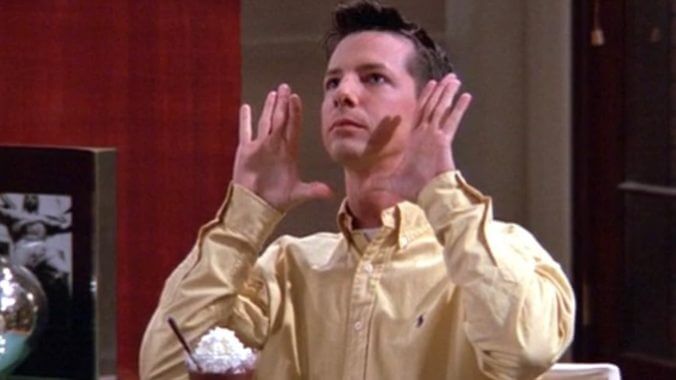Will & Grace 25 Years on: Problematic or Iconic?

This September marks 25 years since Will & Grace first aired. Being two years old at the time, I wasn’t fully aware of the significance of a primetime network comedy with two gay male leads. Then, growing up, I often heard it referenced as a hack job when it came to gay rights and queer representation, so I set Will & Grace aside as something old-fashioned and made for my parents’ generation, like Frasier or financial security.
Then I recently took Will & Grace on as a comfort watch and was shocked. Not by it being outdated, but quite the contrary. In 2023, Will & Grace feels like a more honest, self-aware look at gay life in a city than almost any other show I can remember on TV in the last couple of decades.
The show, which originally ran on NBC for eight seasons, follows the amusing and messy personal and romantic escapades of Will (Eric McCormack), a thirty-something gay lawyer, and his straight best friend Grace (Debra Messing), an interior designer, alongside their eccentric sidekicks Jack (Sean Hayes) and Karen (Megan Mullally), whose full-time jobs seem to be being the bane of Will and Grace’s respective lives.
I went into watching it expecting my political correctness twitch—firmly embedded in my hippocampus since attending university during the Trump administration—to be on high alert. I was anticipating a guilty pleasure at best. But, the occasional misjudged joke aside, it’s not only a pleasure, but an artifact people should examine and learn from in how to present minorities with depth and heart, rather than with a superficial brush.
Will is a more nuanced, complex queer character than any from this century and I think more queer men today might feel themselves represented in him. He’s really annoying and really endearing, and as a result, really recognizable. He and Jack casually reference their sex lives, but the show is not preoccupied with the minutiae of gay sex, nor with coming out, like almost everything else we see in film and TV these days. Will carries an anxiety, a hopelessness, and a dryness that feel very real and which I think gets lost among diluted, saccharine queer representation of today.
In fact, due to the lack of emphasis on gayness as sexuality only (men having sex with men, coming out) is a relief. Heartstopper and Red, White & Royal Blue, for example, are obsessed with the closet and anxieties around gay sex, which counterproductively end up reinforcing homophobic preoccupations and fears.
-

-

-

-

-

-

-

-

-

-

-

-

-

-

-

-

-

-

-

-

-

-

-

-

-

-

-

-

-

-

-

-

-

-

-

-

-

-

-

-








































